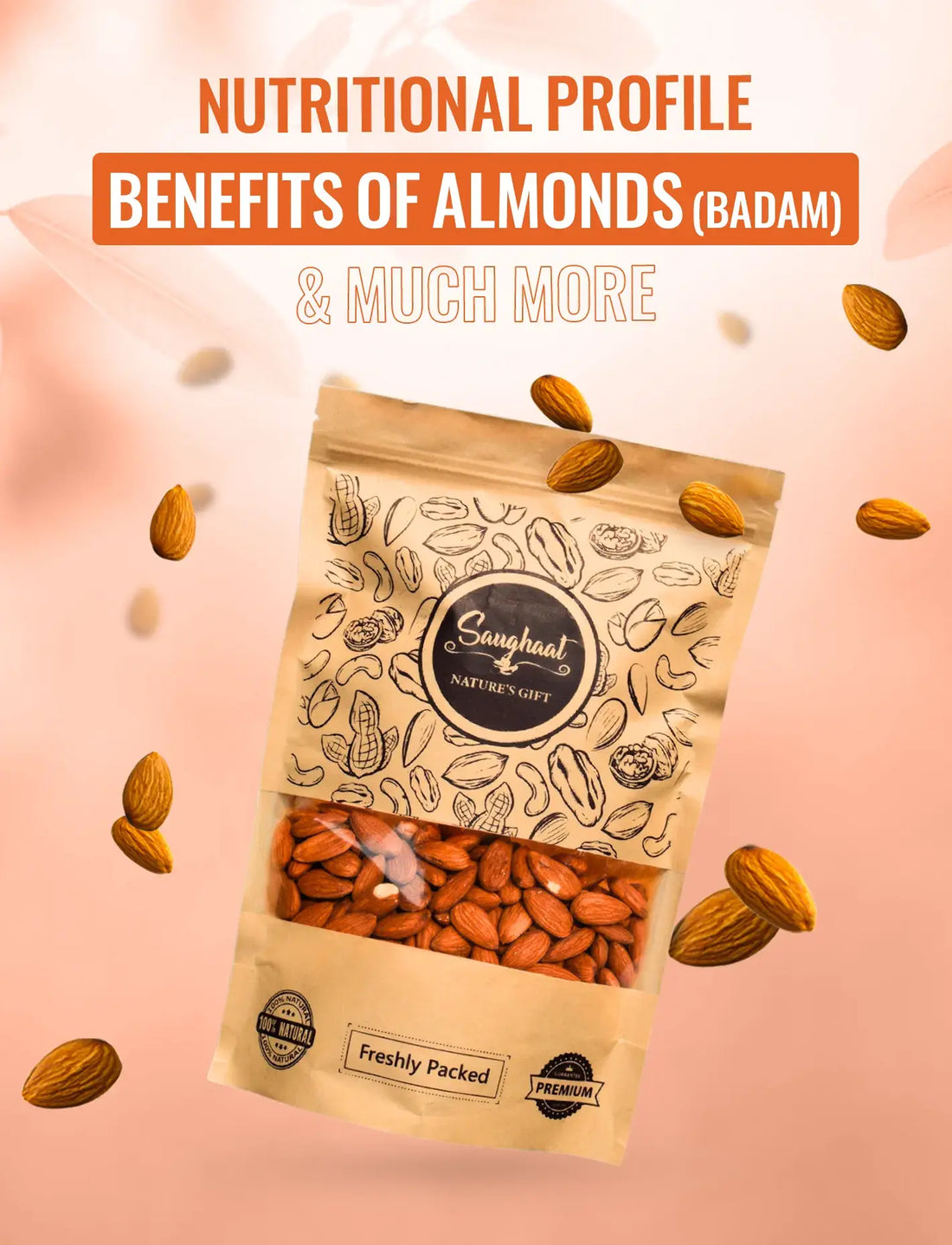
Nutritional Profile, Benefits of Almonds (Badam) and Much More
Share
Almonds (Badam) have a rich and symbolic history, dating back thousands of years. In Ancient Rome, they were used to symbolize fertility and were showered upon newlyweds. As the benefits of almonds are diverse, this heightened demand has brought challenges. They thrive in a hot Mediterranean climate, limiting the regions suitable for large-scale cultivation. This exacerbates issues in these areas, primarily water shortages. Additionally, the need for exportation, often over long distances, adds to the industry's carbon footprint.

Nutritional Value
They are a nutritional powerhouse with several health-promoting properties. They offer essential vitamins and minerals vital for human well-being:
- Vitamin E: Vitamin E is a potent antioxidant present in abundance that combats free radicals responsible for aging and disease development.
- Magnesium: They contain substantial magnesium, which participates in numerous biochemical processes. A deficiency can lead to physical and psychological issues, such as high blood pressure and anxiety.
- Calcium: Well-known for its role in bone and dental health, calcium also contributes to blood clotting and muscle contraction, potentially impacting cardiovascular health.
Health Benefits of Almonds
They are unequivocally superfoods, brimming with essential nutrients and potent proteins that are indispensable for everyone. The adage holds true consuming a few badam daily is a wise practice due to the plethora of benefits they offer. To corroborate this claim, here are five compelling health advantages of this dry fruit for women, substantiated by scientific research. Additionally, we'll provide effortless ways to integrate these into your meals, snacks, and desserts.
- Enhanced Brain Function:
They, owing to their richness in riboflavin and L-carnitine, stand out as brain-boosting superfoods. These compounds mitigate inflammatory processes within the brain, thereby sustaining optimal neurological function and thwarting cognitive decline.
For mature women and those at risk of cognitive disorders like dementia and Alzheimer's disease, making this dry fruit a regular dietary inclusion is recommended. Whether you opt for raw form of this edible nut or employ them as a protein-rich snack, the key is to enjoy them periodically and engage in mentally stimulating activities to nurture cognitive vitality.
- Gut Health Enrichment:
They function as prebiotics, providing nourishment to the beneficial gut bacteria linked to immunity, anti-inflammation, and mental well-being. These "superfoods" are instrumental in maintaining a robust digestive system, averting various ailments and nutritional deficiencies.
Research indicates that probiotics present in them, including their skins, contribute to the cultivation of advantageous gut flora, fostering digestive benefits. Notably, studies reveal that women who consumed 56 grams of these edible nuts per day for eight weeks observed an augmentation in beneficial gut bacteria.
- Cardiovascular Well-being:
They extend comprehensive protection to your heart through multiple mechanisms. They lower levels of "bad" LDL cholesterol while preserving or elevating "good" HDL cholesterol, safeguarding heart health. These nuts are also instrumental in blood pressure reduction and the enhancement of vascular function.
This, in turn, leads to improved relaxation of blood vessels and diminished arterial rigidity. Additionally, the abundance of heart-nourishing compounds in these edible nuts, particularly antioxidant flavonoids found in almond skin, curtails the risk of cardiovascular ailments and the incidence of heart attacks.
- Enhanced Skin Health:
They offer a natural means to achieve radiant, healthy skin. Rich in vitamin E and antioxidants, they combat free radicals and mitigate inflammation, thereby preserving the youthful and vibrant appearance of your skin.
- Facilitating Weight Loss:
Almonds nutrition, belonging to the category of tree nuts, can contribute to reduced waist measurements and a lower body mass index. Their combination of fiber, plant-based protein, and healthy fats induces a sense of fullness, curbing recurring hunger pangs.
Recent studies suggest that these nuts provide approximately 20% fewer calories than their label indicates, as certain calories remain unabsorbed in the digestive process. By incorporating them into your diet, alongside mindful eating and regular physical activity, you can efficiently maintain a balanced diet and achieve weight loss goals.

Additional Benefits:
These edible nuts are instrumental in fortifying your teeth and bones, courtesy of their magnesium, calcium, and phosphorus content. They are an abundant source of dietary fiber, with 12 to 15 percent of an almond's weight comprising fiber. However, given that these are calorie-dense, they should not be the sole source of dietary fiber.
Daily Almond Intake:
These nuts are calorie-rich, necessitating careful inclusion in your diet to maintain overall caloric balance. There are 160 calories in almonds. Nutritionists recommend a safe daily intake of six to eight badam. Whether consumed in their raw form, incorporated into meals, or blended into almond butter, they hold their nutritional value. Even when soaked overnight they offer both flavor and nutrition. It is recommended to opt for these edible nuts in unsalted and unprocessed form, steering clear of salted and fried varieties.
Almonds in Pakistan
In Pakistan, the most common type of badam found and consumed are typically sweet almonds (Prunus dulcis). These are widely available and are used in various culinary applications, including snacks, desserts, and cooking. The specific variety of these sweet edible nuts may vary, but they are generally similar to the California variety, which is widely cultivated and distributed globally. It's essential to note that the availability of almond varieties may be influenced by factors such as local agricultural practices and import sources.
Price Range
Almond price in Pakistan depends on various factors such as market conditions, harvest season, and global trends. Saughaat in Pakistan offers three main types of badam i.e. American, Abdul Wahidi and Khairadini. Almond 1kg price in Pakistan may vary between 500-1500 Rs..
Conclusion:
They are nutrition powerhouses, replete with an array of health benefits for women. Ensuring that your body remains healthy and functions optimally entails incorporating them into your daily diet. However, mindful consumption is essential, considering the caloric density of this dry fruit. They, indeed, hold a special place in the realm of health and wellness.
